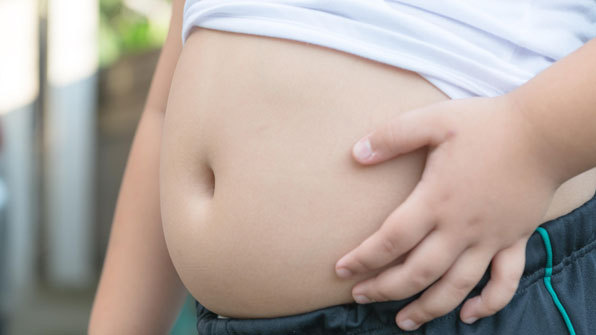[Weekender] Bad eating habits contribute to childhood obesity
By Shin Ji-hyePublished : March 16, 2018 - 17:12
Being a working mom is not easy for Lee Yeong-kyung, a mother of a 6-year-old boy. But what makes Lee lose her temper is when her son’s waistline becomes a topic of discussion.
“Whenever my friends and family see my child, they say that I need to manage his weight and that friends will make fun of him,” Lee said.
“I feel guilty as if I made him gain weight. I often have no time to make him balanced meals as I leave home early for work. After work, I often buy him junk food that he likes, such as hamburgers or pizzas, to make up for my absence,” she said.
But the more he craves junk food, the more he seems to gain weight.
Lee is one of many facing problems with childhood obesity in South Korea.
According to a white paper released by the National Health Insurance Service in December, the obesity rate of 6-year-olds stood at 7.68 percent in 2016, a rise from 7.3 percent in 2012.
The childhood obesity problem is mainly attributed to unbalanced diets, increased TV time, skipping breakfast and the habit of eating fast. Some 32 percent of kids who eat fast and watch TV for more than two hours are obese.
“Whenever my friends and family see my child, they say that I need to manage his weight and that friends will make fun of him,” Lee said.
“I feel guilty as if I made him gain weight. I often have no time to make him balanced meals as I leave home early for work. After work, I often buy him junk food that he likes, such as hamburgers or pizzas, to make up for my absence,” she said.
But the more he craves junk food, the more he seems to gain weight.
Lee is one of many facing problems with childhood obesity in South Korea.
According to a white paper released by the National Health Insurance Service in December, the obesity rate of 6-year-olds stood at 7.68 percent in 2016, a rise from 7.3 percent in 2012.
The childhood obesity problem is mainly attributed to unbalanced diets, increased TV time, skipping breakfast and the habit of eating fast. Some 32 percent of kids who eat fast and watch TV for more than two hours are obese.

“The longer they watch television, the less physical activities they do, and this leads to obesity. Eating fast also means they don’t have good eating habits,” said Moon Jin-soo, a professor of Seoul National University Hospital’s pediatrics division.
The obesity rate of kids above 7 has also risen, according to a survey released by the Ministry of Education on Wednesday.
The obesity rate of elementary, middle and high school students stood at 17.3 percent last year, a 0.8 percentage point rise from the previous year and a 6.1 percentage point increase from 2008.
Teenage obesity mainly could stem from bad eating habits and a lack of physical activity.
According to the ministry, 8 in 10 teenagers eat junk food such as hamburgers, pizzas and fried food more than once a week. Among high school students, some 18 percent skip breakfast and 58 percent exercise less than three times a week.
Furthermore, kids and teenagers from families in the lower-income group are likely to be more obese than those from other income groups.
According to the white paper by the NHIS, the less income a family has, the more likely the children are to be extremely obese.
This is because children from low-income families often do not have balanced diets and lack key vitamins such as vitamins A and C. In addition, to satisfy their hunger, they may eat more snacks, candy and chocolate.
“The health inequality of children is a serious social issue related to the economy, education, medical care and welfare. Efforts are needed to address this challenges together with families, schools, the private sector and the government,” said Lee Jae-hoon, chief of the nongovernmental organization ChildFund Korea.
By Shin Ji-hye (shinjh@heraldcorp.com)







![[Graphic News] More Koreans say they plan long-distance trips this year](http://res.heraldm.com/phpwas/restmb_idxmake.php?idx=644&simg=/content/image/2024/04/17/20240417050828_0.gif&u=)
![[KH Explains] Hyundai's full hybrid edge to pay off amid slow transition to pure EVs](http://res.heraldm.com/phpwas/restmb_idxmake.php?idx=644&simg=/content/image/2024/04/18/20240418050645_0.jpg&u=20240419100350)






![[From the Scene] Monks, Buddhists hail return of remains of Buddhas](http://res.heraldm.com/phpwas/restmb_idxmake.php?idx=652&simg=/content/image/2024/04/19/20240419050617_0.jpg&u=20240419175937)

![[KH Explains] Hyundai's full hybrid edge to pay off amid slow transition to pure EVs](http://res.heraldm.com/phpwas/restmb_idxmake.php?idx=652&simg=/content/image/2024/04/18/20240418050645_0.jpg&u=20240419100350)

![[Today’s K-pop] Illit drops debut single remix](http://res.heraldm.com/phpwas/restmb_idxmake.php?idx=642&simg=/content/image/2024/04/19/20240419050612_0.jpg&u=)